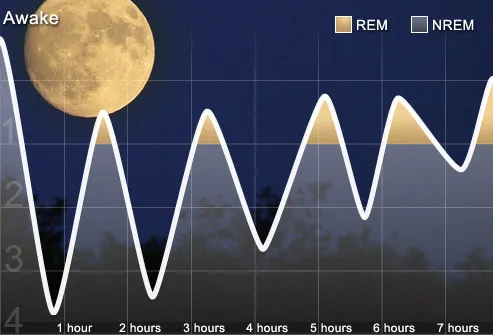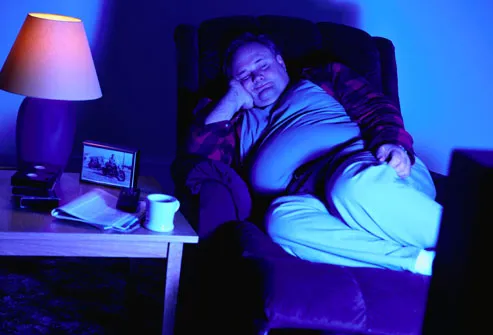Ill Health and Lifestyle
"Sleep apnea and diabetes go hand in hand."
"Sleep helps our bodies restore themselves. Without enough sleep, we can actually bring on diabetes [Type 2, adult-onset]."
Dr. Florence Comite, endocrinologist, New York City
"The pressure from trying to breathe stretches the heart, which puts out a diuretic."
"Men blame their prostates, and women blame menopause, but really it's their sleep apnea that's causing them to have to go to the bathroom at night."
Robert Rosenberg, sleep specialist

Obstructive sleep apnea (OSA) is the most common type of apnea causing breathing to briefly come to a halt. The less common and infinitely more dangerous type, central sleep apnea (CSA), is where breathing stops completely and for relatively long periods, a situation that can be fatal in its consequences. Weight loss is the first prescribed remedy for treatment of sleep apnea. If weight loss fails to address the condition, doctors prescribe a mask or nose plugs to feed pressurized air into the airways.
Should those alternative treatments be unsuccessful, surgery to unblock obstructions becomes an option. Type 2 diabetes is not to be confused with Type 1, formerly named juvenile-onset. Type 1 diabetes is generally visited upon the young among whom some have a family history of diabetes. For them diabetes onset is related to a failure of the pancreas to produce insulin, likely resulting from a failure in the immune system where the Islands of Langerhans are attacked and destroyed.
Type 2 diabetes is seen as a lifestyle disease, afflicting mostly middle-aged and older sedentary people who become overweight, presenting as a perfect candidate for hormonal imbalance. Weight loss, a resolve to become physically active can often return an individual with Type 2 diabetes onset back toward a balance of health. With Type 1 diabetes, eating healthily in moderate amounts and regular exercise helps balance blood sugar levels, but cannot reverse the effect of beta cells' insulin incapacity.

New research appears to point to a relationship between sleep deprivation and diabetes; diabetes symptoms disturb sleep, and sleep loss in its turn contributes to diabetes. With the addition of psychological stress and the condition of obesity a vicious cycle results. Those suffering from Type 2 diabetes produce too little insulin and too much glucose; without the balance required to allow insulin to usher the glucose into the cells requiring them for energy.
Type 2 diabetes appears to have become more common in society even as the sleeping hours of the average North American has been reduced. While seven to nine hours of sleep nightly is considered ideal according to the American Diabetes Association, a good 35 percent of society suffers inadequate hours of sleep. Complicating the relationship between diabetes and sleep are the situations arising out of diabetes and its management.
Complications such as restless-leg syndrome during the night and neuropathy where nerve pain or numbness occurs as living with diabetes long term begins to erode other body functions results in an inability to sleep comfortably and well, in turn continuing the progress of harm to the body's functional health. And apnea, breathing interruption caused by obstructed airways, is being recognized as a major culprit in complicating peoples' health conditions.
Sleep of adequate quantity and quality permits human growth hormone (HGH) and insulinlike growth factor 1 (IGF-1)to grow cells and repair tissues; normal body functions. Sufficient sleep enables the body to produce leptin, a hormone that depresses the appetite; when sleep is lacking, the end product is more ghrelin, stimulating the appetite and in turn sleep deprivation increases cortisol that prevents insulin from entering the cells (insulin resistance).
The amount of oxygen feeding the brain and heart is additionally reduced when apnea prevents normal sleep patterns to prevail. Older males with thick necks or sunken chins and people whose waists are encircled with excess weight are more commonly assailed with sleep apnea. Among those with diabetes even those who are not obese are at risk for developing sleep apnea.

Impaired health and the conditions ill health impose on the body can be complex and dangerous. The best way to avoid such complications is to practise good health by eating sensibly, focusing on nutritious whole foods taken in moderation, and not succumbing to the urge to just sit around and allow the only body that your lifetime will allow you to become impaired through disuse.
Labels: Exercise, Health, Moderation

0 Comments:
Post a Comment
<< Home